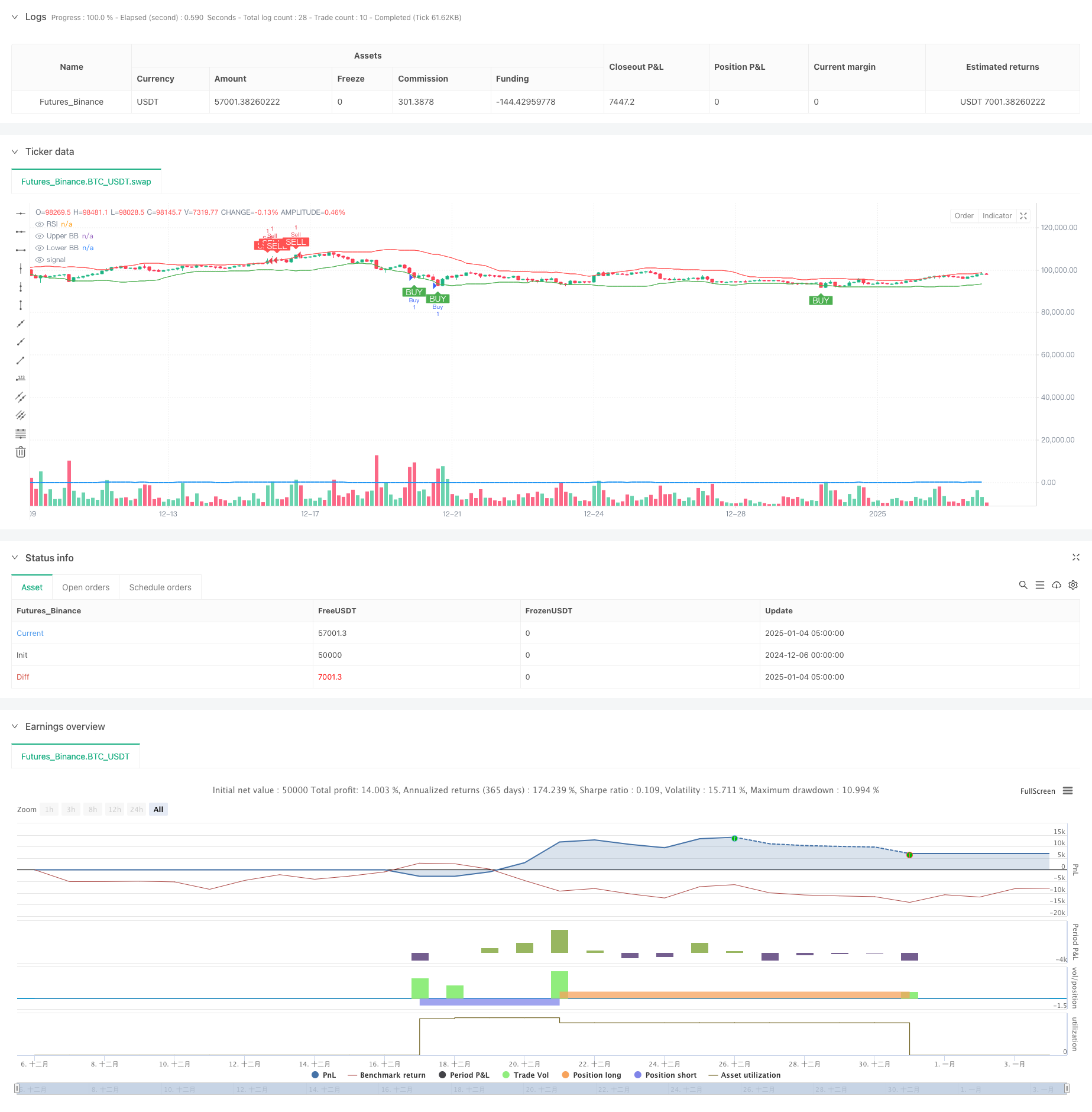이중 기술 지표 모멘텀 역전 거래 전략 및 위험 관리 시스템
저자:차오장, 날짜: 2025-01-06 16:45:01태그:RSIBBRRSMA

전반적인 설명
이 전략은 RSI와 볼링거 밴드 지표를 결합한 모멘텀 역전 거래 시스템으로, 과소매 및 과소매 영역을 식별하도록 설계되었습니다. 리스크 관리를 위해 후속 스톱 로스로 1: 2 리스크-어워드 비율을 구현합니다. 핵심 논리는 RSI와 볼링거 밴드 모두 동시에 과소매 또는 과소매 신호를 표시 할 때 거래를 실행하여 엄격한 리스크 관리를 통해 자본을 보호합니다.
전략 원칙
이 전략은 14주기 RSI와 20주기 볼링거 밴드를 주요 지표로 사용합니다. 구매 조건은 모두: 30 이하의 RSI (oversold) 와 하부 볼링거 밴드 또는 그 이하의 가격을 필요로 합니다. 판매 조건은 모두: 70 이상의 RSI (oversold) 및 상부 볼링거 밴드 또는 그 이상의 가격을 필요로 합니다. 시스템은 트레일링 스톱을 위해 5바르 고/하점을 사용하며, 수익을 취하는 경우 스톱 손실 거리의 두 배로 설정하여 1: 2 리스크-어워드 비율을 엄격히 유지합니다.
전략적 장점
- 이중 표시기 필터링은 신호 품질을 향상시키고 잘못된 신호를 줄입니다.
- 포괄적인 시장 관점을 위해 동력과 변동성 지표를 결합합니다.
- 트레일링 스톱과 고정된 위험/이익 비율을 포함한 엄격한 위험 통제 메커니즘
- 정서적 간섭을 제거하는 완전 자동 시스템
- 이해하기 쉽고 유지하기 쉬운 명확한 전략 논리
전략 위험
- 트렌딩 시장에서 빈번하게 멈출 수 있습니다.
- 이중 조건은 일부 거래 기회를 놓칠 수 있습니다.
- 고정된 RSI 및 볼링거 밴드 매개 변수는 모든 시장 조건에 적합하지 않을 수 있습니다.
- 트레일링 스톱은 변동성 시장에서 너무 일찍 포지션을 종료 할 수 있습니다.
- 연속적인 손실을 처리하기 위해 적절한 자금 관리가 필요합니다.
최적화 방향
- 시장 변동성에 기초한 지표 설정을 동적으로 조정하기 위한 적응 매개 변수 메커니즘을 구현
- 강한 트렌드 중 반전 거래를 일시 중지하도록 트렌드 필터를 추가합니다.
- 시장 조건에 적응하는 역동적인 위험/이익 비율 시스템을 개발
- 신호 신뢰성을 향상시키기 위해 볼륨 확인을 포함합니다.
- 트레일링 스톱이나 시간 기반 출구와 같은 더 유연한 스톱 손실 메커니즘을 구현하십시오.
요약
이것은 이중 기술 지표를 통해 정확성을 향상시키고 엄격한 리스크 관리를 사용하는 잘 구성된 반전 거래 전략입니다. 간단하고 직관적이지만 성숙한 거래 시스템에 필요한 모든 주요 요소를 포함합니다. 제안된 최적화 방향에 의해 전략은 추가 개선의 여지가 있습니다. 라이브 거래에 대해 철저한 백테스팅과 매개 변수 최적화가 권장됩니다.
/*backtest
start: 2024-12-06 00:00:00
end: 2025-01-04 08:00:00
period: 3h
basePeriod: 3h
exchanges: [{"eid":"Futures_Binance","currency":"BTC_USDT"}]
*/
//@version=5
strategy("RSI + Bollinger Bands with 1:2 Risk/Reward", overlay=true)
// Define Inputs
length_rsi = input.int(14, title="RSI Period")
oversold_level = input.int(30, title="RSI Oversold Level")
overbought_level = input.int(70, title="RSI Overbought Level")
length_bb = input.int(20, title="Bollinger Bands Period")
src = close
risk_to_reward = input.float(2.0, title="Risk-to-Reward Ratio", minval=1.0, step=0.1)
// Calculate Indicators
rsi_value = ta.rsi(src, length_rsi)
basis = ta.sma(src, length_bb)
dev = ta.stdev(src, length_bb)
upper_band = basis + 2 * dev
lower_band = basis - 2 * dev
// Define Buy and Sell Conditions
rsi_buy_condition = rsi_value < oversold_level // RSI below 30 (buy signal)
bollinger_buy_condition = close <= lower_band // Price at or near lower Bollinger Band (buy signal)
rsi_sell_condition = rsi_value > overbought_level // RSI above 70 (sell signal)
bollinger_sell_condition = close >= upper_band // Price at or near upper Bollinger Band (sell signal)
// Combine Buy and Sell Conditions
buy_condition = rsi_buy_condition and bollinger_buy_condition
sell_condition = rsi_sell_condition and bollinger_sell_condition
// Plot Buy and Sell Signals with white text and green/red boxes
plotshape(series=buy_condition, location=location.belowbar, color=color.green, style=shape.labelup, title="Buy Signal", text="BUY", textcolor=color.white, size=size.small)
plotshape(series=sell_condition, location=location.abovebar, color=color.red, style=shape.labeldown, title="Sell Signal", text="SELL", textcolor=color.white, size=size.small)
// Calculate Swing Points (for Stop Loss)
swing_low = ta.lowest(low, 5) // Last 5 bars' low
swing_high = ta.highest(high, 5) // Last 5 bars' high
// Calculate Risk (Distance from Entry to SL)
long_risk = close - swing_low
short_risk = swing_high - close
// Calculate Take Profit using 1:2 Risk-to-Reward Ratio
take_profit_long = close + 2 * long_risk
take_profit_short = close - 2 * short_risk
// Strategy Execution: Enter Buy/Sell Positions
if buy_condition
strategy.entry("Buy", strategy.long)
strategy.exit("Take Profit", "Buy", limit=take_profit_long, stop=swing_low) // Set TP and SL for Buy
if sell_condition
strategy.entry("Sell", strategy.short)
strategy.exit("Take Profit", "Sell", limit=take_profit_short, stop=swing_high) // Set TP and SL for Sell
// Plotting the Indicators for Visualization (Optional - comment out if not needed)
plot(rsi_value, color=color.blue, title="RSI", linewidth=2, display=display.none)
plot(upper_band, color=color.red, title="Upper BB", display=display.none)
plot(lower_band, color=color.green, title="Lower BB", display=display.none)
관련
- 높은 승률 트렌드는 반전 거래 전략을 의미합니다.
- 볼링거 밴드 RSI 거래 전략
- 볼링거 밴드 및 RSI 크로스오버 거래 전략
- 볼링거 밴드 및 RSI 결합 거래 전략
- RSI와 볼링거 밴드 시너지 스윙 거래 전략
- 볼링거 밴드 및 RSI 결합 동적 거래 전략
- 양적 거래 전략에 따른 다기술 지표 융합 추세
- 적응적인 볼링거 밴드 역동적 포지션 관리 전략
- 고 정밀 RSI 및 Bollinger Bands 브레이크업 전략
- RSI와 볼링거 밴드 횡단 회귀 이중 전략
더 많은
- 다기간의 슈퍼트렌드 다이내믹 피라미딩 거래 전략
- 장기 트렌드 SMA 크로스오버 양적 전략
- 양적 거래 전략에 따른 다기술 지표 융합 추세
- 다기술 지표 모멘텀-MA 트렌드 전략
- 스마트 R2R 기반의 스톱 로스 관리와 함께 트리플 EMA 크로스오버 거래 시스템
- 동적 변동성 원동 고주파 EMA 크로스오버 양적 전략
- EMA-Smoothed RSI 및 ATR 동적 스톱 로스/익스피스 취득에 기초한 다중 시간 프레임 양적 거래 전략
- 적응적 피보나치 볼링거 밴드 전략 분석
- 멀티 타임프레임 촛불 패턴 거래 전략
- 멀티 타임프레임 슈퍼트렌드 동적 트렌드 거래 알고리즘
- 적응적 리스크 관리와 함께 고급 MACD 크로스오버 거래 전략
- 촛불 빗 길이를 분석한 양적 트렌드 포착 전략
- 통계적 이중 표준 오차 VWAP 브레이크업 거래 전략
- 유출 및 목표 수익에 기반한 긴 네트워크 전략
- 동적 이동 평균 크로스오버 트렌드 ATR 리스크 관리 시스템과 전략에 따라
- 다중 지표 최적화된 KDJ 트렌드 크로스오버 전략